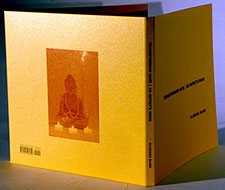 Transforming Hate By Clarissa Sligh Asheville, North Carolina: Clarissa Sligh, 2016. Edition of 1000. 8 x 8"; 108 pages including covers. Perfect bound softcover. Four-color offset lithography. Illustrated paper wrappers with flaps. Housed in foldout die-cut box with gold foil origami crane inserted into cover slot. Signed and numbered by the artist on book's front cover flap. Clarissa Sligh: "I am interested in history and memory and stories as told by ordinary everyday people. In this artist's book, historical elements are used as a framing device to construct my own personal narrative within our society's shared history of trauma. This journey began when I finally allowed myself to face the reality of white supremacist books. While working on the book's images and texts, I imagined it as dark and dramatic. Finally I accepted that regardless of life's challenges, 'the place' where I live is beautiful. The origami cranes that I made from the pages of the white supremacist books were beautiful. So I had to allow this book to be beautiful too! "I hope that the reader will come along on the journey." Clarissa Sligh, introduction: "In 2006, the Holter Museum of Art in Helena, Montana, and the Montana Human Rights Network invited me to create an artwork for a group exhibition. The invitation requested that artists incorporate, transform, or respond to white supremacist hate books that had been acquired by the Human Rights Network from a defecting member of one of the groups. "I had not seen them, but I knew these books were out there. The concept of making artwork that transformed printed hate materials seemed a perfect fit with my explorations of one's place within the historical narratives of race, class, and gender. "When the Montana Human Rights Network sent me a box of the white supremacist books, I found it difficult to even touch them. Just seeing the books triggered fear and memories of the time and place where I grew up. Jim Crow laws had placed schools, churches, hospitals, libraries, restaurants, and movie theaters off limits to me because of my race. That environment determined who I was and my place in society. "That box of books made me realize that the conditioning to hate is very much alive and the recruitment of others to hate those who are seen as different continues to this day. Thinking 'transformation' and looking for a way to handle the books, I remembered the thousands of origami cranes I saw while visiting the Hiroshima Peace Memorial in Japan in 1985. A close friend had also folded cranes to commemorate a loved one. "I began using pages from the books to fold origami cranes. The folding also connected me with my earlier years of studying karate where I learned that the act of doing a thing over and over opens doors to understanding things previously inaccessible. "While folding the pages, I began to see the beauty of the folded paper forms. The text was obscured and the portions of words that were revealed made them something else. I began photographing the cranes at each stage of the folding process in order to document the shapes and forms. Afterwards nearly a thousand cranes were folded and hung together with glass faceted beads and shipped to the Holter Museum for the exhibition. "Making this book came later. I was trying to look at what it was like for me to turn hateful words into a beautiful art object. What evolved from that exploration helped me understand more fully the many levels of oppression and violence at the intersections of race, gender, class, and sexual orientation. "In 2012, I completed a 'one of a kind' accordion book that entitled Transforming Hate: The Proposal. I saw it as being about accepting the challenge to transform containers of hate. After making that book, I continued writing in my journals. At some point I began to look at my own personal relationship with hate. I saw our shared history and my life within that history from a different perspective. Each folded origami crane had been a prayer. Folding one crane after another had become a chant. "In Transforming Hate: An Artist's Book, I hope the viewer will revisit his or her own perceptions about history, reality, identity, and voice. Why do we keep each other from being who we really are? Can we begin to talk about what separates us? Do we have the courage to live differently?" |